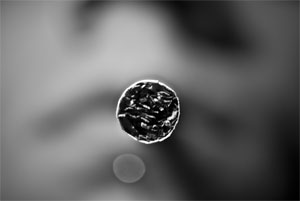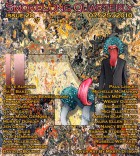Where does this story come from? Is it based on observation, personal experience, or a mixture of the two?
I have to pass by a couple of guys trying to give me free newspapers on my way to and from work, but I don’t want to take one because I know that most days the paper, well it’s just gonna tell me all about the bad things that are happening in the world, and I guess sometimes I just want to feel blind to that, so I walk on by the stands, by the guys handing out the newspapers, and I smile about it, because my mood stays good when I make this same decision day in day out, and I think these guys get that, and they smile back at me like they respect my decision as a fine one.
It seems to me that in the story there is a gradual build-up from a quaint, almost idyllic beginning (the description of the “patches”) to a kind of “hellish” cacophony. How did this develop? Was it planned or did it simply happen during writing?
Yeah, I think you’re right about there being a shift in the tone of the story, or maybe just a bolt of realisation towards the end of it, there’s a kind of cover-up going on, some kind of championing of ignorance being bliss, like everyone in the story: the guys handing out the papers, the blind woman, and everyone else walking by, it’s like they all know what kind of shit there is, happening around them, all of the time, of course they do—the hellish reality of what people do to each other, you don’t forget that kind of shit, it just gets overlapped by other priorities and everyday life stuff—the smaller bites of reality, the necessary’s, and this other stuff going on, this reported stuff found in newspapers etc., it isn’t immediate enough for people to often care enough, but it can still be immediate enough to bring a mood down in a life that already might not be that great, so by the guys saying it’s hell out there, it’s like them saying ‘forget about it’—so when Darren and Yousef respond to the blind woman you have to understand that they’ve seen how it is for her, she’s got it tough, and they want to spare her some of that, they’re doing her a favour by laying it on bluntly without details, because the detail is where more of the pain lies, and I think they’re pretty likeable for that, as they watch her walk away into what’s already a harsh life to lead.
I was so struck by the line, “It’s hell out there, darlin’.” Who are Darren and Yousef—the newspaper sellers who “have no idea what in God’s name was going on in the world”? Are they fallen angels?
Darren and Yousef are wise to their work commitments, they hand out free newspapers as required of them, but they don’t buy into what they do, they’re not company men, and they don’t subject themselves to all that the paper contains; if anything, when I think of them, they’re sort of like pharmacists leading on from a doctors lead—they hand out newspapers like pharmacists handing out drugs, and with it they feel this obligation to disclose what might be understood as being a health warning because a newspaper can be a fucked-up trip, but Darren’s and Yousef’s responsibility stops there, because they can’t be blamed for this personal delve by a citizen into the bigger picture of what goes on, that is their choice to make.
What are your writing projects at the moment? Is this story part of “something bigger”—a collection, for instance?
I’m slowing down a little with my writing right now as I want to be/do better, see it’s kinda hard to be that okay with what you’re writing when you’re reading Richard Yates or something by Jonathan Franzen or reading Far From the Madding Crowd again for the fifth time over, but I’m still going to be doing it because all of the above names, and because I’m just walking around and being me and going to work and being in love and all those things that somehow merge into ideas that walk and talk around my head, usually when I’m trying to go to sleep, but it’s when I can’t contain them in my head alone any more that I’ll start writing them down again, but right now my head and my heart and the span of my body, they’re a storehouse for them all, and that feels quite healthy, as though I’m ripening through both sweet and sour tastes whilst finding a way to present a spectrum of them all within my writing.



 The SmokeLong Grand Micro Contest (The Mikey) is now an annual competition celebrating and compensating the best micro fiction and nonfiction online.
The SmokeLong Grand Micro Contest (The Mikey) is now an annual competition celebrating and compensating the best micro fiction and nonfiction online.